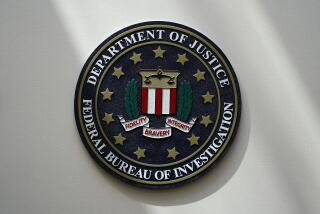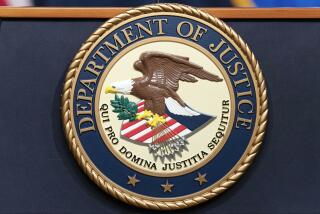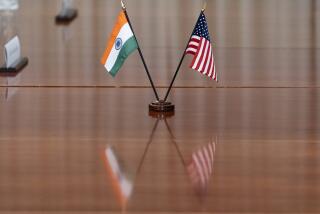Key Al Qaeda Suspect Is Held
- Share via
WASHINGTON — U.S. and Pakistani officials said Friday that authorities had captured Ramzi Binalshibh, a suspected organizer of the Sept. 11 attacks who may also have been planning to be the 20th hijacker.
U.S. officials confirmed that Pakistan had identified Binalshibh as one of eight Al Qaeda operatives captured by Pakistani authorities during a prolonged shootout in the bustling port city of Karachi on Wednesday. U.S. officials confirmed that the CIA and other U.S. agencies helped in the raid and the arrest of Binalshibh.
The arrest ended an intense manhunt and came amid criticism that the U.S.-led war on terrorism has been largely unsuccessful because so many leaders of the Al Qaeda network remain fugitives.
German authorities issued an international arrest warrant for Binalshibh, a former Hamburg roommate of hijack plot leader Mohamed Atta, less than two weeks after Sept. 11. Authorities had been hunting for him since.
“This is a significant blow to Al Qaeda,” one U.S. official said.
In a separate development, authorities said five men of Yemeni descent, at least some of them American citizens, were arrested near Buffalo, N.Y., on suspicion of involvement in terrorist activity. The officials said more details would be provided today.
In Binalshibh’s case, Pakistani officials said that they captured eight Al Qaeda operatives--six of Yemeni origin, as well as an Egyptian and a Saudi--and that one of them was a “very senior” member of the terrorist organization who had been the subject of an intensive international manhunt.
Several U.S. officials confirmed that the suspected senior operative was Binalshibh, a 30-year-old Yemeni who authorities believe played a central role in the terrorist plot.
U.S. and Pakistani officials would not comment on where Binalshibh was being held.
U.S. officials say that besides being in on the Sept. 11 plot from the beginning, Binalshibh tried at least four times to gain entry into the United States but was denied a visa each time. They believe that he intended to be the fifth hijacker on one of the four commandeered planes and that he later tried to help get accused terrorist Zacarias Moussaoui onto the plane in his place by wiring him money and providing other logistical help.
Binalshibh also wired money to several of the hijackers in the United States and to a Florida flight school at which one of the hijackers was training, according to the indictment of Moussaoui.
Moussaoui, the only surviving suspect to be charged in U.S. courts, is set to stand trial in the United States early next year.
Binalshibh “was the 20th hijacker, and he was the money man. The question is, what is he going to reveal and what records can they find?” said Steven Emerson, an expert on Al Qaeda who consults for Congress on terrorism issues.
“He clearly could answer a lot of questions. He has it in his head. It depends on if he talks. But this is very significant. If he flips, he could provide information on cells here, and in Europe, and could help with the prosecution of Moussaoui, which isn’t going well.”
U.S. officials discussed the case on condition of anonymity, citing the extraordinary sensitivity of taking a top Al Qaeda operative into custody in Pakistan, particularly in Karachi, where anti-American fervor is strong.
They also said Pakistani and U.S. officials had tried to keep the arrest confidential in order not to tip off more Al Qaeda operatives believed to be hiding in the Karachi area.
Chief among them may be Khalid Shaikh Mohammed, a shadowy figure who is thought to have come up with the idea for the Sept. 11 attacks. A journalist for the Arab satellite TV station Al Jazeera reported last week that he had met recently with Binalshibh and Mohammed in or near Karachi. In their interviews with Al Jazeera, the two men seemed to taunt the United States.
News of Binalshibh’s arrest, first reported by ABC News, circulated in the United Nations on Friday, where Pakistani President Pervez Musharraf, President Bush and other world leaders met this week. Musharraf’s position “has been that we have gotten some people in custody and that one of them is a very important person who you [the United States] have been looking for,” a Pakistani official said in an interview with The Times.
“It is a near certainty that it is him,” the official said, referring to Binalshibh. “From all indications from all sources, it is quite probable that it is him.”
U.S. and Pakistani officials said all that remained was a final, conclusive identification of Binalshibh, who has apparently eluded capture for the past year by using a number of aliases.
The Pakistani official said Pakistan’s intelligence agency, the Inter-Services Intelligence unit, was responsible for the capture of the Al Qaeda members in the shootout, which lasted four hours.
Pakistani commandos traded automatic gunfire with the Al Qaeda suspects, who were holed up in an apartment. The gun battle was so fierce that it spilled out onto adjoining rooftops, and two suspects were killed and several officers wounded.
“The ISI led the operation,” the Pakistani official said. “This shows that despite the criticism of them, that they are a full partner in the war on terrorism.”
The ISI has long been criticized for not investigating Al Qaeda activity in Pakistan or even protecting members of the terrorist organization.
Binalshibh allegedly worked closely with some of the 19 hijackers when they plotted the Sept. 11 attacks from an apartment in Hamburg, Germany.
German authorities have said the planning for a major attack against the United States appears to have started in October 1999. Within six months, the Hamburg group’s Al Qaeda sponsors reportedly fixed on the World Trade Center as a fitting target.
Cell members then set off for Afghanistan in two groups for training, German authorities said. Other hijackers followed several months later. They used their time in the Afghan training camps to work out details of the attacks with their Al Qaeda hosts, according to the German officials.
Binalshibh was born in Hadramawt, a mountain valley region of Yemen that is Osama bin Laden’s ancestral home. While all the other members of the Hamburg cell came to Germany as college students, Binalshibh came in 1995 seeking political asylum under a false name.
He was assigned to live in a small camp for asylum seekers and lived for two years in a government barracks so cramped and austere government workers referred to it as a container camp. He was among a group of Arabs camp administrators called “the bulls” because they were aggressive in complaints about their living conditions. Binalshibh was the tamest of the bulls, “always in the background. When there was trouble he would disappear,” said Michael Hirsekorn, the camp’s administrator.
Binalshibh’s asylum appeal was eventually denied, but he already had returned to Yemen. However, he reapplied under his real name, received a German visa and eventually applied to a couple of German colleges. He never attended classes regularly.
In the winter of 1998, Atta, Binalshibh and Said Bahaji, who is being sought by authorities, moved into a neat, newly refurbished three-bedroom apartment at Marienstrasse 54, near Atta’s university.
The United States has been searching for Binalshibh, particularly after finding a videotape of him that U.S. officials said was discovered in an Al Qaeda leader’s house in Afghanistan. On that tape, Binalshibh is seen delivering a martyrdom message.
In the past week, Al Jazeera aired the interviews it said were between its investigative reporter and Binalshibh and Khalid Shaikh Mohammed.
In the interview, the man claiming to be Binalshibh said he would have taken part in the attacks had his application for a U.S. visa been accepted. He also said he helped coordinate the attacks.
Also, Pakistani police officials said that nine more terrorist suspects were rounded up Friday from two separate places in Karachi and that they may be linked to those captured Wednesday, Associated Press reported. No further information on them was immediately available.
*
Times staff writers Greg Miller in Washington, and Tyler Marshall in Hong Kong and Terry McDermott in Los Angeles contributed to this report.
More to Read
Sign up for Essential California
The most important California stories and recommendations in your inbox every morning.
You may occasionally receive promotional content from the Los Angeles Times.











